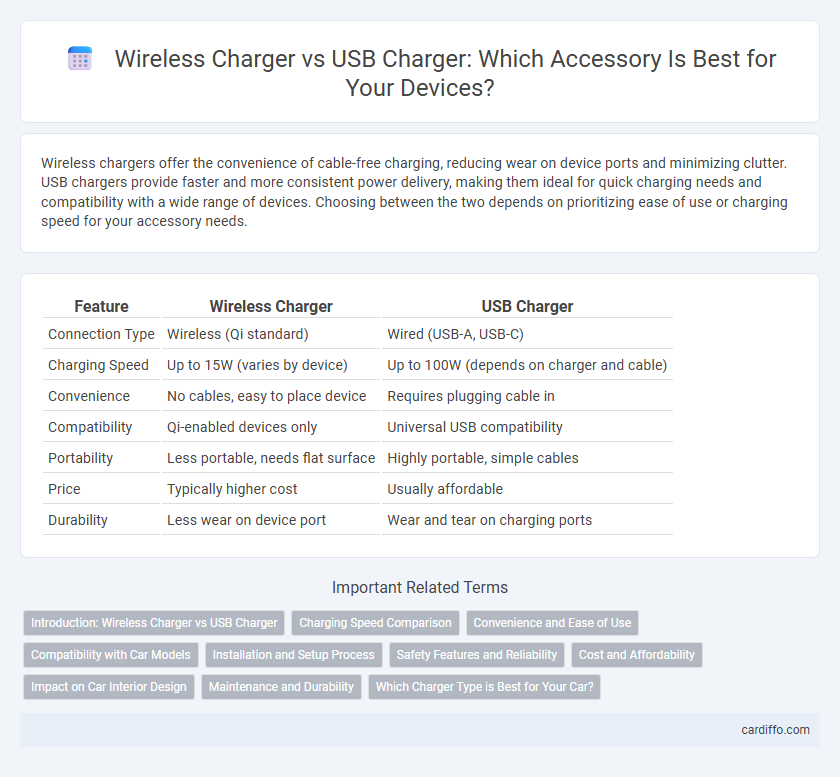Wireless chargers offer the convenience of cable-free charging, reducing wear on device ports and minimizing clutter. USB chargers provide faster and more consistent power delivery, making them ideal for quick charging needs and compatibility with a wide range of devices. Choosing between the two depends on prioritizing ease of use or charging speed for your accessory needs.
Table of Comparison
| Feature | Wireless Charger | USB Charger |
|---|---|---|
| Connection Type | Wireless (Qi standard) | Wired (USB-A, USB-C) |
| Charging Speed | Up to 15W (varies by device) | Up to 100W (depends on charger and cable) |
| Convenience | No cables, easy to place device | Requires plugging cable in |
| Compatibility | Qi-enabled devices only | Universal USB compatibility |
| Portability | Less portable, needs flat surface | Highly portable, simple cables |
| Price | Typically higher cost | Usually affordable |
| Durability | Less wear on device port | Wear and tear on charging ports |
Introduction: Wireless Charger vs USB Charger
Wireless chargers use electromagnetic fields to transfer energy without cables, providing the convenience of placing devices on charging pads. USB chargers require a physical connection via cables to deliver power, offering compatibility with a wide range of devices and faster charging speeds in many cases. Choosing between wireless and USB chargers depends on user preference for portability, charging speed, and device compatibility.
Charging Speed Comparison
Wireless chargers typically deliver charging speeds ranging from 5W to 15W, depending on the device and charger model, while USB chargers can provide significantly faster charging, often up to 100W with USB Power Delivery technology. USB chargers utilize direct wired connections, enabling rapid energy transfer and faster device recharge times compared to the more convenient but slower wireless method. For users prioritizing charging speed, high-wattage USB-C chargers remain the superior option over standard Qi wireless charging pads.
Convenience and Ease of Use
Wireless chargers offer unmatched convenience by eliminating cables and allowing devices to charge simply by placing them on a charging pad. USB chargers require physical connection, which can be less convenient but often provide faster charging speeds and compatibility with multiple device types. The ease of use with wireless chargers makes them ideal for quick top-ups, while USB chargers remain essential for efficient, high-power charging needs.
Compatibility with Car Models
Wireless chargers offer broad compatibility with newer car models equipped with Qi-standard wireless charging pads, enabling seamless device integration without cables. USB chargers maintain universal compatibility across virtually all vehicles with USB ports or adapters, supporting a wide range of device types and brands. Choosing between the two depends on the specific car model's built-in features and the user's preference for cable-free convenience versus widespread connectivity.
Installation and Setup Process
Wireless chargers require minimal installation, typically involving just placing the charging pad on a flat surface and connecting it to a power source, making setup quick and clutter-free. USB chargers often need a compatible cable and device port connection, which can vary in complexity depending on the device and charger type. Wireless charging eliminates the need for cable management, while USB chargers may require additional adapters or cable organization for optimal use.
Safety Features and Reliability
Wireless chargers incorporate built-in temperature control and foreign object detection systems, minimizing risks of overheating and short circuits, enhancing user safety. USB chargers often have overcurrent and overvoltage protection, providing stable power delivery and reducing device damage. Reliability in wireless chargers depends on coil alignment and charging efficiency, whereas USB chargers offer consistent performance through direct wired connections.
Cost and Affordability
Wireless chargers generally cost more upfront compared to USB chargers due to advanced technology and convenience features. USB chargers offer greater affordability and widespread compatibility, making them a cost-effective choice for budget-conscious consumers. Evaluating initial investment against long-term usability helps determine the most economical option for individual charging needs.
Impact on Car Interior Design
Wireless chargers eliminate the need for visible cables, creating a cleaner and more streamlined car interior that enhances aesthetic appeal and reduces clutter. USB chargers require wired connections, often resulting in tangled cables and limited placement flexibility, which can disrupt the sleek design of modern dashboards and centers consoles. Integrating wireless charging pads into car interiors supports seamless device placement and preserves the minimalist design favored in contemporary vehicle cabins.
Maintenance and Durability
Wireless chargers generally require less maintenance due to fewer exposed ports and connectors, reducing the risk of dust accumulation and wear. USB chargers benefit from durable cable designs and replaceable cords, allowing for easy repairs when damaged. Both options provide longevity, but wireless chargers often excel in durability as they avoid physical connection wear and tear.
Which Charger Type is Best for Your Car?
Wireless chargers offer the convenience of cable-free charging and seamless integration with modern car interiors, supporting Qi-enabled devices for hassle-free power. USB chargers, on the other hand, provide faster charging speeds and compatibility with a wider range of devices through direct cable connections, making them ideal for those prioritizing efficiency. Choosing the best charger for your car depends on whether ease of use or charging speed aligns more with your daily driving needs.
Wireless charger vs USB charger Infographic

 cardiffo.com
cardiffo.com